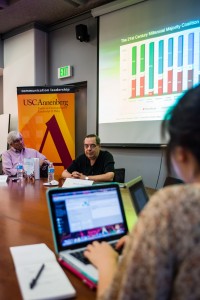Author discusses millennials
Morley Winograd, a senior fellow at the USC Annenberg Center on Communication Leadership & Policy, and Geoffrey Cowan, former dean of the Annenberg School for Communication and Journalism, addressed students in a lecture entitled “Privacy, Entertainment and the Millennial Generation” on Tuesday.

Generation gap · Author and former White House official Morey Winograd discusses how millennials will change and adapt to social media. – Tony Zhou | Daily Trojan
Winograd, who recently published an e-book entitled Millennial Majority, is an expert on the millennial generation.
Around 20 students, many of whom were part of Cowan’s ASCJ 100 elective, “The Changing World of Communication and Journalism,” attended the event.
The discussion started with the role the millennial generation has played and will play in politics. Winograd cited mobility as the key to this generation’s lifestyle. Those under 30 struggle with the choice between individual freedom and collective responsibility, Winograd said.
The notion of collective action has been ingrained into society from everything regarding the way people assess traffic with Waze to the choices people make for a meal with Yelp. Organizing society has changed from electing experts to relying on the wisdom of a group. This idea of communion is something Winograd expressed as a defining point of the millennial generation. Even the definitions of bad and good are more trusted if they come from a group than if they come from an individual.
Winograd honed in on how millennials are incapable of making decisions for themselves. Most students in the room agreed they would rather read a review on movie-rating website Rotten Tomatoes than trust a movie review in a newspaper. Some said that they would choose Rotten Tomatoes because it incorporates a group of opinions versus newspaper articles.
The conversation soon shifted from the material students choose to read about movies to the medium on which they read articles. Students said they relied on apps such as Fandango and Flixster to help them choose a movie.
“All of those apps assume that there is wisdom in the group, and that it is smarter than being experts,” Winograd said of the trend toward digital media.
Students at the talk tended to agree with Winograd’s analysis of their generation.
“The USC community is greatly affected by this concept, because I can’t really name many people that aren’t involved in social networking. People are really influenced by social sharing, often distracting them from their classwork,” Raquel Zsupnik, a junior majoring in communication who works for the CCLP, said. “This isn’t necessarily a bad thing; it’s just because we’re so used to so much technology surrounding us that we don’t know anything different.”
Students also acknowledged the harms associated with social media and the amount of personal information released to the public. In spite of this, nearly all claimed even this couldn’t prevent them from updating their Facebook or sending a tweet.
“You’re the generation most willing to trade off privacy for benefits,” Winograd said.
For the USC community, the benefits seem to outweigh the cost of privacy.
“Personally for me, as a business administration major, it’s just going to have an impact on how I see entrepreneurial opportunities. This shows that social media has changed the world of journalism, which is definitely something to take into account when picking out your major,” freshman Cubby Sporrong said.
Others saw social media affecting students past college and in future careers.
“Students could have both positive and negative views on social media, but either way it’ll just shape the way students do things with careers in the future,” Avae Masaniai, a sophomore majoring in communication, said.
As USC students and the rest of the millennial generation embrace the growing role of collective decision-making and social media in their lives, Winograd stressed the “ability to tell stories,” as he said it will be valuable for the future of media.
“America will never be the same,” Winograd said.
Follow us on Twitter @dailytrojan
